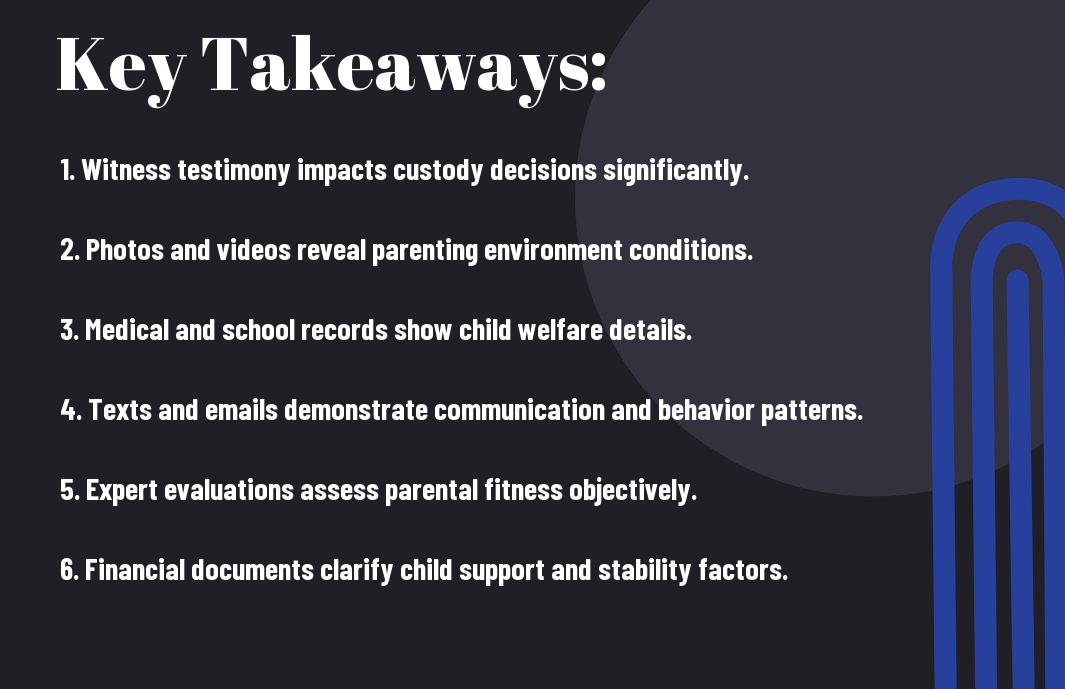Over the course of a child custody case, understanding the different types of evidence that can influence the outcome is crucial for every parent. From emotional stability to parenting capabilities, knowing what can support your claims or defend against allegations is vital. If you’re involved in a custody dispute, equipping yourself with this information can help ensure the best possible environment for your child. In this blog post, we will explore the most relevant forms of evidence and how they can impact your custody case. Digital Forensic Squad will be your trusted partner in securing your custody rights.
Key Takeaways:
- Different types of evidence, such as witness testimony, documented communication, and children’s preferences, can significantly influence custody decisions in court.
- Behavioral evidence, including parental involvement and the ability to provide a stable environment, is often highly valued by judges when assessing a parent’s suitability.
- Legal and professional documentation, such as psychological evaluations and school reports, can provide objective insights into the child’s well-being and needs, impacting custody rulings.
Understanding Evidence in Child Custody Cases
To navigate the complexities of child custody cases effectively, it is imperative to understand the different types of evidence that can influence the outcome. Evidence serves to support your claims and demonstrate your suitability as a parent. Knowing what constitutes valid evidence can significantly impact your case.
Definition of Evidence
Across child custody cases, evidence is defined as any form of information presented in court to substantiate claims regarding the child’s well-being and the ability of each parent to provide a stable environment. This can include documents, testimonies, and various forms of records.
Importance of Evidence in Custody Decisions
By providing relevant and compelling evidence, you enhance your chances of receiving a favorable custody arrangement. Courts rely heavily on evidence to assess the best interests of the child, making it a pivotal aspect of custody decisions.
Consequently, the quality and type of evidence you present can significantly shape the court’s perception of your parental capabilities. Gathering documented proof, such as school records, health reports, and witness testimonies can demonstrate your active involvement in your child’s life. Additionally, positive character references can showcase your parenting style, while documentation of any past unfavorable behaviors from the other parent can also be impactful. Properly understanding and utilizing evidence not only helps protect your rights but also ensures the best outcome for your child.


Types of Evidence
Even in child custody cases, the evidence presented can significantly impact the outcome. Understanding the varieties of evidence available ensures you are prepared. Key types include:
- Documentation
- Testimonial
- Character References
- Financial Records
- Behavioral Evidence
Thou should strive to gather comprehensive and relevant evidence to support your case.
| Type of Evidence | Description |
| Documentation | Written records, such as emails, texts, and reports |
| Testimonial | Statements from people who can support your parenting skills |
| Character References | Letters of support from friends and family |
| Financial Records | Evidence of your financial stability and economy |
| Behavioral Evidence | Documentation of how you interact with your child |
Documentation Evidence
Below are necessary types of documentation evidence you should gather for your custody case. This may include communication records, police reports, or previous court documents. Organize these records carefully, as they will substantiate your claims and provide clarity on your parenting history.
Testimonial Evidence
Documentation of supporting testimonies from teachers, counselors, or babysitters can strengthen your position in custody matters.
Also, obtaining testimonials or statements from individuals who observe your relationship with your child can be beneficial. These testimonials can highlight your positive parenting practices and indicate your involvement in your child’s life. Make sure these individuals can articulate details that shed light on your parenting strengths, as well as any concerns they may have regarding the other parent. Such pronounced testimonies are pivotal in assisting you to establish a case for favorable custody.
Physical Evidence
After a divorce or separation, physical evidence plays a vital role in child custody cases. This type of evidence encompasses documents and materials that can substantiate your claims regarding your child’s well-being. Common forms include photographs, videos, and even witness testimonies that can illustrate any potential risks to your child’s safety or highlight your parenting capabilities. Collecting and presenting this physical evidence effectively can strengthen your position in custody negotiations.
Medical Records
On reviewing your child’s medical records can provide significant insight into their physical and emotional well-being. These documents may reflect any ongoing medical issues, allergies, or behavioral concerns that could influence custody decisions. Ensure you have copies of check-ups, vaccinations, and any assessments from healthcare professionals, as these records can effectively demonstrate your proactive involvement in your child’s health.
Educational Records
The educational records of your child, including report cards, attendance records, and special education evaluations, can be pivotal in custody cases. They illustrate your child’s academic performance and social development, shedding light on their stability and well-being. Providing this information can help establish a clear picture of your involvement in your child’s education and the environment you provide for their growth.
But the importance of educational records goes beyond mere grades. They can help pinpoint any developmental issues or social challenges your child may face, potentially affecting their long-term happiness. Active participation in your child’s education can also highlight your commitment as a parent. Showcasing positive reports and consistent attendance records reinforces your role in creating a stable and nurturing environment, which can weigh favorably in custody considerations.
Character Evidence
For child custody cases, character evidence plays a vital role in demonstrating your suitability as a parent. This includes information about your behavior, habits, and moral standards, which can be presented through testimonies from friends, family, and colleagues. If you want to learn more about the Best evidence for child custody cases, understanding how character evidence influences decisions can empower your case.
Background Checks
For thoroughness in legal proceedings, background checks can significantly affect custody outcomes. Courts may investigate your criminal record, financial stability, and any history of substance abuse. Such checks help paint a complete picture of your lifestyle and can be pivotal in establishing your ability to provide a safe and stable environment for your child.
Personal References
Against the backdrop of legal evaluations, personal references can enhance or damage your case. While supportive testimonies highlight your strengths as a parent, negative references may suggest shortcomings. You should strive to gather endorsements from individuals who can genuinely attest to your parenting skills and reliability.
Due to the subjective nature of personal references, it’s important to choose your advocates carefully. Focus on individuals who know you well and can speak to your positive parenting qualities, such as your commitment to your child’s well-being and your ability to provide emotional support. However, be cautious; references should not have any conflicts of interest or biases that could undermine their credibility. A balanced mix of personal and professional references will fortify your position in custody discussions.
Expert Testimony
Now, expert testimony plays a significant role in child custody cases, as it provides an objective perspective that can greatly influence the court’s decision. Professionals, such as psychologists and parenting evaluators, offer insights that highlight the best interests of the child, which is the primary focus for judges. Their evaluations can help illuminate various factors, including each parent’s capabilities and the child’s emotional needs, thereby assisting you in building a stronger case.
Child Psychologists
After obtaining insights from a child psychologist, you can better understand your child’s emotional and psychological needs during a custody dispute. These experts evaluate the child’s wellbeing and may offer recommendations that can support your custody claims, ultimately advocating for the child’s best interests in the process.
Parenting Evaluators
Above all, parenting evaluators serve as neutral parties who assess each parent’s capabilities and the dynamics of their relationships with the child. Their findings can significantly impact custody arrangements, giving you clear insights into what works best for your family.
Indeed, parenting evaluators conduct comprehensive assessments that include interviews, observations, and psychological tests to determine each parent’s strengths and weaknesses in caregiving. This detailed evaluation not only highlights potential concerns about parenting qualities but also offers recommendations for improvement. Understanding their findings can help you address any issues proactively, paving the way for a more favorable outcome in custody decisions. The insights gained from these evaluations are invaluable as they can position you as a more competent and understanding parent in the eyes of the court.
The Role of Witnesses
Despite the complexities of custody cases, witnesses play a significant role in presenting evidence that can influence decisions. Their testimonies, whether from family, friends, or professionals, help establish the child’s best interests. For an in-depth discussion about various Types of Evidence in Child Custody Cases, consider the importance of witness statements and how they contribute to your case.
Family and Friends
For many cases, family and friends can provide invaluable insights into your parenting abilities and the child’s living environment. Their perspectives can help demonstrate your commitment to the child’s well-being and your ability to provide a stable, loving home.
Professionals Involved
After family and friends, the testimonies of professionals, such as teachers, counselors, or healthcare providers, can greatly influence a custody case. These individuals often have direct experience with your child’s behavior and development, providing objective insights into their needs.
This testimony from professionals is especially important because they can highlight your child’s strengths and areas of concern. Their observations may shed light on your parenting style, showing whether you prioritize your child’s education and emotional health. Also, keep in mind that their expertise can help the court understand the child’s needs better. Ultimately, their support can enhance your case, but it’s vital to ensure that their views are aligned with your parenting philosophy and provide a balanced and positive impression of your capabilities as a parent.
Final Words
Ultimately, understanding the types of evidence in child custody cases is vital for every parent navigating this challenging process. By familiarizing yourself with documentation such as financial records, witness testimonies, and expert evaluations, you can build a stronger case to support your custody goals. It’s crucial to gather evidence that reflects your commitment to your child’s best interests, ensuring that you present a compelling narrative to the court. Staying informed and organized will empower you to advocate effectively for your parental rights and the well-being of your child.
FAQ
Q: What types of evidence can be presented in child custody cases?
A: In child custody cases, various types of evidence can be presented to help determine the best interests of the child. Key types include:
- Documentary evidence: This includes records such as medical documents, school reports, and communication between parents (emails, texts) that showcase parenting abilities and involvement.
- Testimonial evidence: Witnesses, such as family members, teachers, or childcare providers, can testify about the child’s well-being and each parent’s relationship with the child.
- Expert evidence: Professionals such as psychologists or child welfare experts may provide insights regarding the child’s needs and the parents’ suitability.
Q: How important is the child’s preference in custody cases?
A: The child’s preference can hold significant weight in custody decisions, particularly as the child matures. In many jurisdictions, children aged 12 and older may have their preferences taken seriously, provided they are expressed clearly and are deemed reasonable. The court will generally consider the maturity of the child and the rationale behind their preference, but it is not the sole factor in determining custody arrangements.


